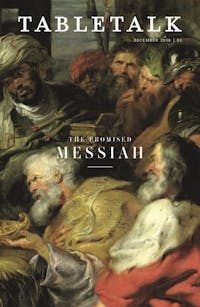
Request your free, three-month trial to Tabletalk magazine. You’ll receive the print issue monthly and gain immediate digital access to decades of archives. This trial is risk-free. No credit card required.
Try Tabletalk NowAlready receive Tabletalk magazine every month?
Verify your email address to gain unlimited access.
Have you ever noticed the number of offers for security systems that bombard homeowners? At least in Central Florida, they seem to be everywhere. Ads for home security systems play regularly during commercial breaks on the radio. Over the years, my mailbox has received innumerable fliers selling the installation and activation of home alarm systems. And I could not begin to tell you the number of salesmen who have rung my doorbell in the hopes of convincing me to purchase monitored protection for my home.
Low-tech security solutions exist as well. We lock our doors. We own watchdogs. We put up fences around our yards. Whatever else we may say about such measures, they prove one thing: we want security.
The desire for security was particularly acute in the ancient world—especially in Israel. Living on a piece of land where three continents—Africa, Asia, and Europe—come together, Israel was in constant danger of being conquered by others who valued its strategic geographic position. And for the royal family, security needs reached a whole other level. You had to both guard the nation and protect the kingly dynasty. Somebody always wanted to take the throne from you.
The promise of security takes center stage in God’s establishing the Davidic covenant, which is recorded in 2 Samuel 7:1–17. God gave a key covenant promise to King David: “Your house and your kingdom shall be made sure forever before me. Your throne shall be established forever” (v. 16). Not only does David get a sure and secure kingdom with an eternal throne, but the kingdom is “sure forever before [God].” David’s house will finally be safe not only from its enemies but also from the holy wrath of God Himself.
More is promised here than simply that David’s family will always have a man on the throne in Jerusalem (2 Sam. 7:15). When even the failures of David’s godly descendants Hezekiah and Josiah make the fall of Judah and exile to Babylon inevitable (2 Kings 20:12–19; 2 Chron. 35:20–27), it is clear that David’s throne cannot endure if it must be held by mere sinners. It will take a supremely righteous son of David to maintain the kingdom’s throne and give it lasting safety from its enemies. It will take a perfectly holy son of David to build an enduring house for God’s name (v. 13). Despite the fact that Solomon built a temple for God in Jerusalem, he could not be this son, for he fell into idolatry, and, moreover, the temple he built was destroyed by Babylon (1 Kings 3–11; 2 Kings 24).
Furthermore, God’s promise of an eternal love for David’s line does not mean that this line gets off scot-free when it falls into sin. God will discipline the line of David “with the rod of men, with the stripes of the sons of men” (2 Sam. 7:14). But the promise here is also more than that David’s line will suffer defeat from other kings when it is disobedient. The same verse that promises discipline also promises that David’s sons will be regarded as sons of God (v. 14). And who else in the Old Testament is regarded as God’s son? His people, Israel (Hos. 11:1). David’s line can stand in for the entire nation. They are, as it were, interchangeable, for both are God’s son. What happens to the son of David happens to the nation. We see this clearly in the case of King Manasseh, who was punished for sin and taken into exile only to be brought back to Jerusalem (2 Chron. 33:10–13). The same thing would later happen to the Judahites, that is, God’s people Israel (36:17–23).

Putting these facts together, we see the shadows of a coming King. This King will be perfectly righteous and able to maintain David’s throne. But this King will also bear God’s punishment for sin, going into exile for sin and returning to God’s blessing of life. And as a consequence of this, those whom He represents are counted as having suffered exile and will return to life as well. This is starting to sound familiar, isn’t it? We are talking, of course, about the final Son of David, Christ Jesus our Lord. He is the perfectly righteous Son of David who enters the exile of God’s judgment, bearing God’s wrath, so as to guarantee the resurrection of His people, Israel (Isa. 53; Matt. 1:1–14; 2 Cor. 5:21). And He holds David’s throne forever (Acts 2:1–36).
There is another son of God mentioned in the Old Testament—Adam, the father of the human race (Luke 3:38). As the Son of God, Jesus can stand in for his descendants also, bearing the exile of God’s judgment so that all who trust in Christ from among the gentiles can be guaranteed resurrected eternal life as well. By faith, Jew and gentile can join God’s people Israel and receive the blessing of safety and security forever.
